
Genus is a taxonomic rank above species and below family as used in the biological classification of living and fossil organisms as well as viruses. In binomial nomenclature, the genus name forms the first part of the binomial species name for each species within the genus.

Herring are various species of forage fish, mostly belonging to the family of Clupeidae.
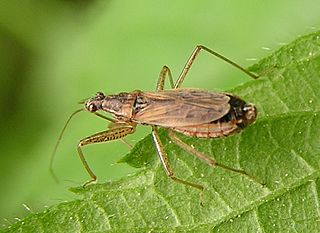
The insect family Nabidae contains the damsel bugs. There are over 500 species in 20 genera. They are soft-bodied, elongate, winged terrestrial predators. Many damsel bugs catch and hold prey with their forelegs, similar to mantids. They are considered helpful species in agriculture because of their predation on many types of crop pests.
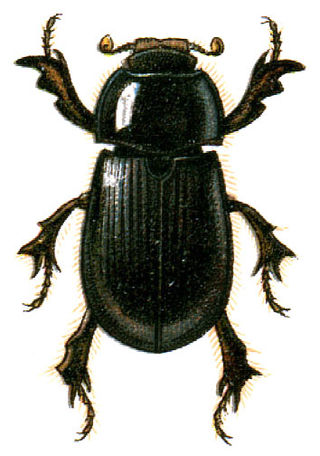
Hybosoridae, sometimes known as the scavenger scarab beetles, is a family of scarabaeiform beetles. The 690 species in 97 genera occur widely in the tropics, but little is known of their biology.

Anthocoridae is a family of bugs, commonly called minute pirate bugs or flower bugs. Worldwide there are 500-600 species.

Cryptophagidae is a family of beetles with representatives found in all biogeographic realms. Members of this family are commonly called silken fungus beetles and both adults and larvae appear to feed exclusively on fungi although in a wide variety of habitats and situations, such as rotting wood and shed animal fur and feathers. These beetles vary from about 1 to 11 millimeters long, and usually have an oval body shape with a slight "waist".
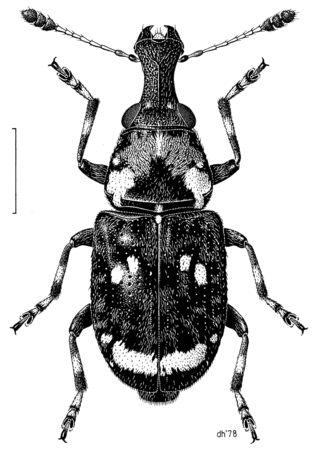
Anthribidae is a family of beetles also known as fungus weevils. The antennae are not elbowed, may occasionally be longer than the body and thread-like, and can be the longest of any members of Curculionoidea. As in the Nemonychidae, the labrum appears as a separate segment to the clypeus, and the maxillary palps are long and projecting.

Myopsocidae is a family of mouse-like barklice, belonging to the infraorder Psocetae of the order Psocodea. This family is closely related to Psocidae, with which it shares similar wing-venation, but from which it is distinguished by three-segmented tarsi.
The World Register of Marine Species (WoRMS) is a taxonomic database that aims to provide an authoritative and comprehensive list of names of marine organisms.

Clivina is a genus of ground beetle native to the Palearctic, the Nearctic, the Near East and North Africa. There are more than 600 described species in Clivina.
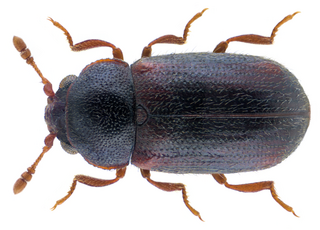
Sphindidae is a family of beetles, in the suborder Polyphaga. They are called slime mold beetles due to their exclusive feeding on slime molds during adult and larval stages, other aspects of their life history are obscure. Palaeontological discoveries since 2015 have added to the geologic history of Sphindidae, including the discovery of Libanopsis, placed in the extinct subfamily Libanopsinae.

The Taiwanese brown-toothed shrew is a species of shrew in the tribe Nectogalini. It is found only in Taiwan. It prefers dense ground cover in forests and subalpine shrublands in high mountains of central Taiwan. Its placement in Episoriculus has been questioned, with genetic analysis finding that it is more basal within Nectogalini than other members of Episoriculus.

Lixus is a genus of true weevils in the beetle family Curculionidae, raised by the Danish entomologist, Johan Christian Fabricius in 1775. There are at least 950 described species in Lixus.

Trachyderini is a tribe of long-horned beetles in the family Cerambycidae. There are at least 140 genera and 650 described species in Trachyderini.

Periscelididae is a family of flies.

Valenzuela is a genus of psocoptera in the family Caeciliusidae, the lizard barklice. Some species are extinct and date to the Eocene of Poland or Russia. There are at least 300 described species in Valenzuela.
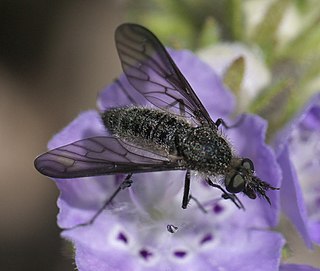
Bombyliinae is a subfamily of bee flies in the family Bombyliidae. There are more than 70 genera in Bombyliinae.

Anastoechus is a genus of bee flies. There are at least 90 described species in Anastoechus.

Anastoechus barbatus is a species of bee flies in the family Bombyliidae.
Anastoechus leucothrix is a species of bee flies.

















